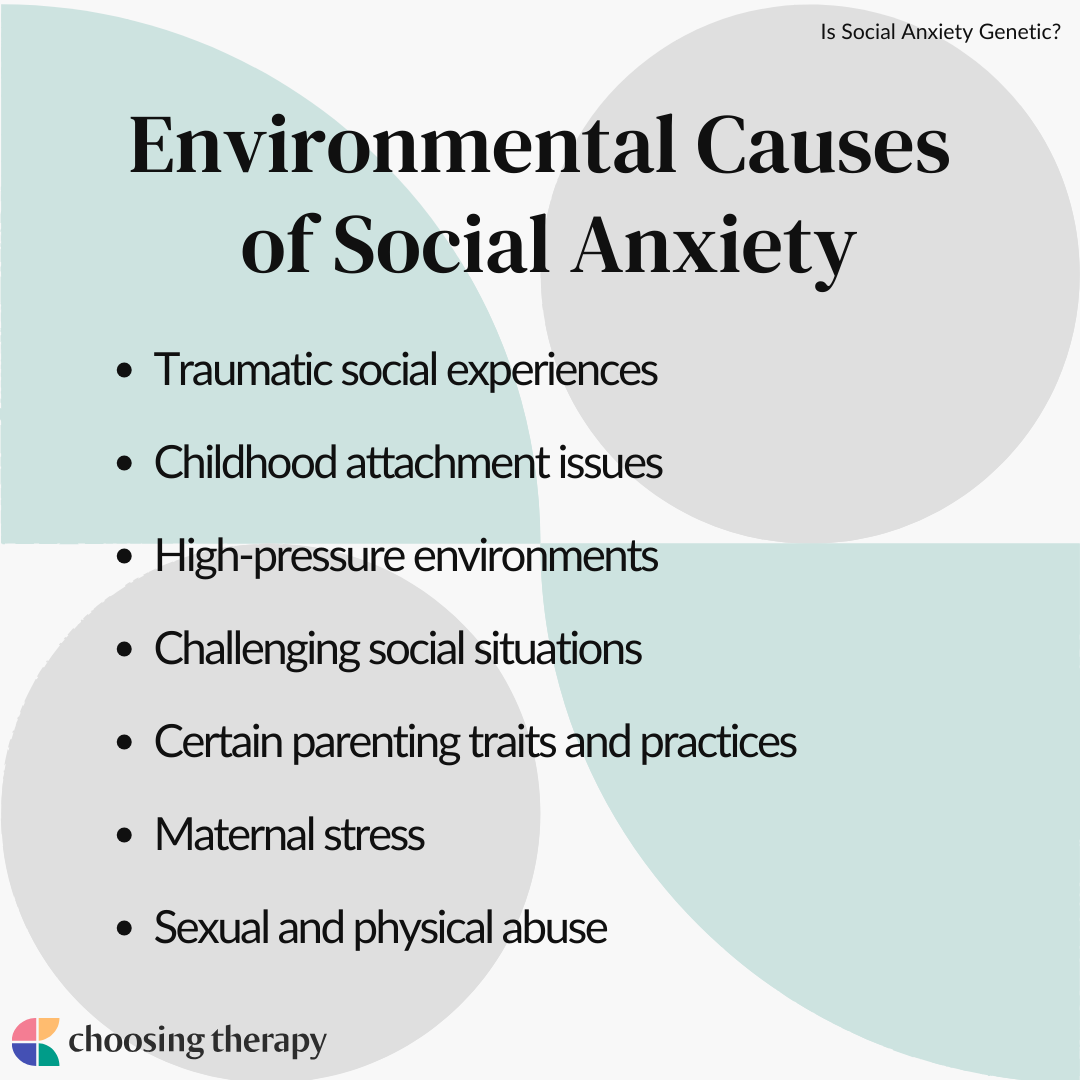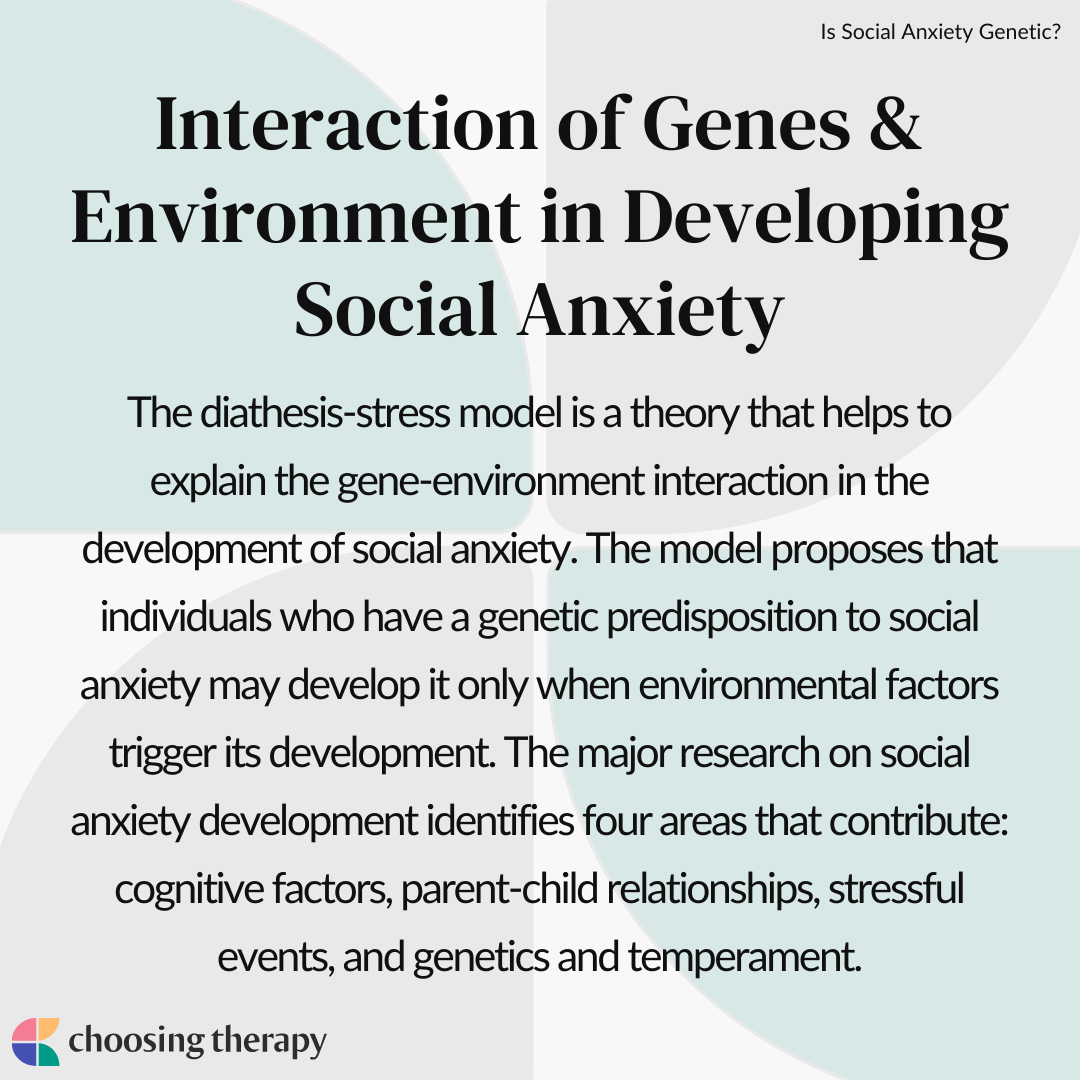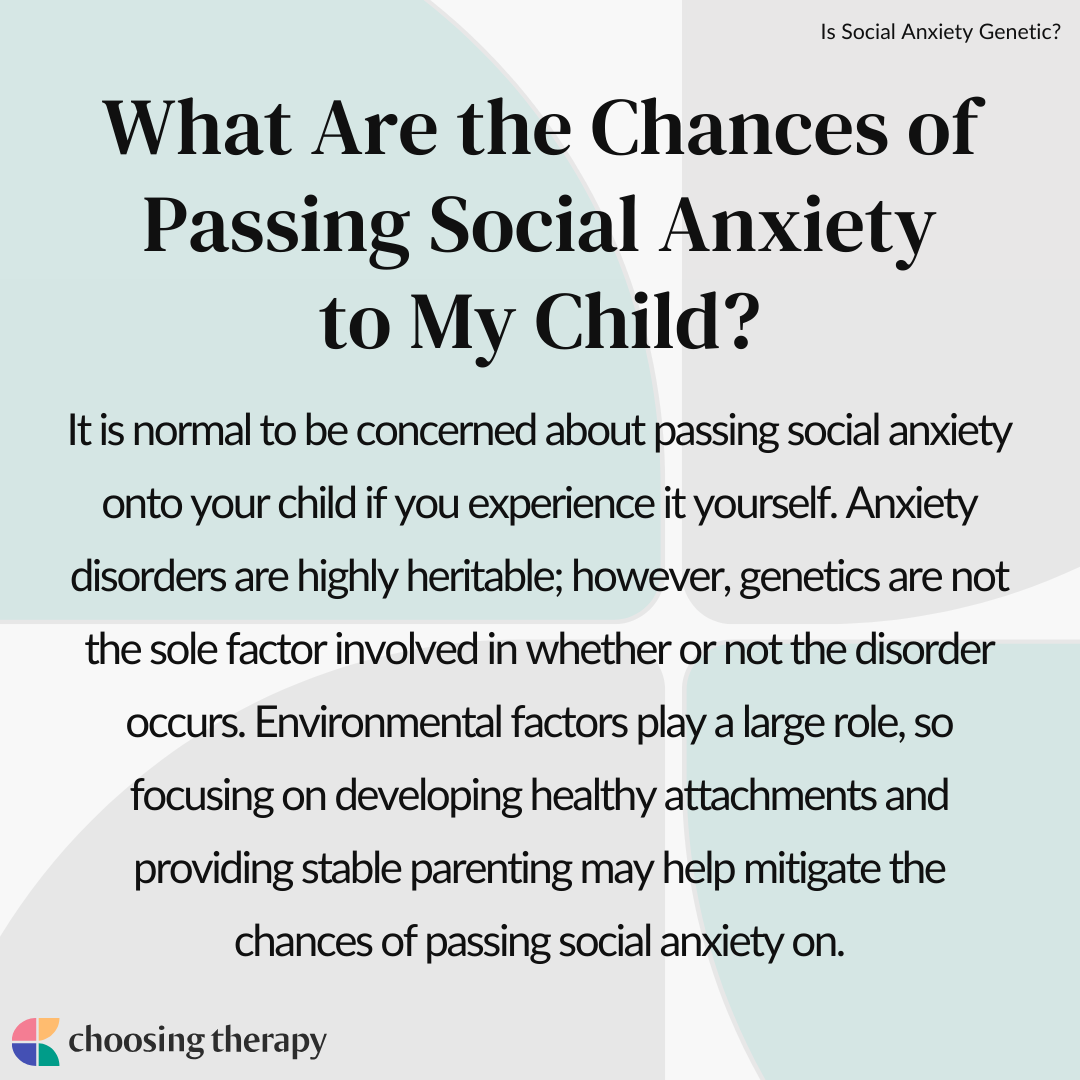Social anxiety is partially genetic. Twin and family studies report genetic influences for social anxiety disorder, although research is ongoing on which genes are involved.1 Experts indicate environmental factors have a strong influence on the development and course of social anxiety disorder, so genetic vulnerability does not necessarily mean you will automatically develop social anxiety disorder.1
Find a supportive therapist who can help with anxiety. BetterHelp has over 20,000 licensed therapists who provide convenient and affordable online therapy. BetterHelp starts at $65 per week. Take a Free Online Assessment and get matched with the right therapist for you.
Is Social Anxiety Genetic?
Twin and family studies document social anxiety disorder as partially influenced by genetics.1 Like most other mental health conditions, social anxiety develops from both genetic and environmental factors. Heritability rates vary from around 27 to 56%.2 Still, it is believed that environmental factors play a large part in whether or not genetic vulnerability to social anxiety causes the disorder to develop.1
Research on the Genetic Markers for Social Anxiety
Research is ongoing around specific genetic markers for social anxiety. This research can offer an increased understanding of social anxiety disorder, leading to earlier intervention and more effective treatment approaches. One study found an association between social anxiety and genetic variants of a gene called MANEA.3 Another study found a linkage between social anxiety and chromosome 16 markers.4
Experts propose that the gene SLC6A2 may also be linked to social anxiety because of its connection to chromosome 16.4 SLC6A2 is involved in the transportation of the neurotransmitter norepinephrine.4 Experts agree that no clear conclusions should be drawn about genetic markers at this stage of research, as it is important for more replications of studies to happen.
Environmental Causes of Social Anxiety
Experts agree that the environment largely impacts the development and course of social anxiety disorder. Lifetime experiences, like parenting factors, trauma, or challenging social situations, can all interact with genetic predispositions and trigger social anxiety. Knowing the environmental causes of social anxiety can help minimize triggers for symptoms if an individual is at a genetic risk.
Here are some common environmental causes of social anxiety:
Traumatic Social Experiences
More experiences of childhood trauma are found to be associated with greater severity of social anxiety symptoms.5 Traumatic experiences might include bullying, cyberbullying, public humiliation, negative family experiences, or social rejection. When traumatic social experiences occur, they increase a person’s likelihood to respond to situations with anxiety and fear later on in life.
Research indicates that when certain genes involved with glutamate and oxidative stress combine with harsh punitive parenting, they may contribute to the development of social anxiety.6 Other research identifies sexual abuse, familial violence, separation from parents, parental marital discord, and childhood illness as connected to the development of social anxiety and exacerbated symptoms.10
Childhood Attachment Issues
Forming a healthy attachment to caregivers is an important part of development. Research documents associations between insecure attachment and social anxiety. Insecure attachment styles, such as anxious attachment or avoidant attachment, form during early interactions with caregivers. Studies show individuals with social anxiety who have insecure attachment often experience greater depression, more severe symptoms, increased avoidant behaviors, and lower levels of life satisfaction than healthy controls.7
High-Pressure Environments
High-pressure environments often cause individuals with social anxiety to experience fear of judgment and fear of failure. Whether these environments are academic or work-oriented, high-pressure environments increase social anxiety because they heighten attention drawn to external achievement. Individuals with social anxiety tend to underestimate their ability to perform tasks, leading to an increase in symptoms when expectations are high.
Challenging Social Situations
Research indicates that challenging social situations are connected to heightened anxiety in socially anxious individuals.8 They typically catastrophize during social encounters and view themselves as unable to handle social challenges, reverting to unhealthy strategies to cope. These strategies include avoidance, safety behaviors, and post-event rumination.8 For example, sometimes people with social anxiety need to have a friend come with them to situations that make them anxious, or they might ruminate about everything that occurred at the event in the days following.
Certain Parenting Traits & Practices
Research indicates specific parenting traits may be involved in the development of social anxiety. Parenting traits such as lack of warmth, rejection, overcontrol, and overprotection are connected to the development of social anxiety.9 Additionally, certain parenting practices are also associated with the development of social anxiety. These include shame tactics, criticism, insensitivity, and anxious parenting practices.9
These negative types of parenting traits and practices can encourage a child to develop distorted perceptions. For example, parenting that exhibits overcontrol decreases a child’s ability to engage in play and exploration and may encourage them to view the world as scary.9 These parenting styles generally lead to increases in general and social anxiety.9
Maternal Stress
Experiences of maternal stress can influence someone’s development of social anxiety. Researchers have indicated a connection between maternal stress during or after pregnancy and the development of mental health disorders, such as social anxiety.10 Since mother and baby share the same environment until birth, experts theorize this may have something to do with shared stress between mother and baby.
Sexual & Physical Abuse
Sexual and physical abuse are associated with social anxiety.11 Past sexual abuse can increase avoidant behaviors, sexual dysfunction, and experiences of social anxiety.11 Sometimes, resilience factors like strong social support can reduce the risk of social anxiety from developing.11
Options For Anxiety Treatment Talk Therapy – Get help from a licensed therapist. Betterhelp offers online therapy starting at $65 per week. Free Assessment Psychiatry for Anxiety – Looking for anxiety treatment that prioritizes you? Talkiatry can help. Find an in-network psychiatrist you can see online. Get started with our short assessment. Visit Talkiatry
Interaction of Genes & Environment in Developing Social Anxiety
The diathesis-stress model is a theory that helps to explain the gene-environment interaction in the development of social anxiety. The model proposes that individuals who have a genetic predisposition to social anxiety may develop it only when environmental factors trigger its development. The major research on social anxiety development identifies four areas that contribute: cognitive factors, parent-child relationships, stressful events, and genetics and temperament.9
For example, someone who has insecure attachment, traumatic childhood experiences, parents with social anxiety, and an anxious temperament will be more likely to develop social anxiety than someone who does not have these genetic and environmental influences. However, someone who has parents who have social anxiety but develops secure attachment, a positive support system, and strong resilience factors may not develop social anxiety even though they are at a genetic predisposition.
What Are the Chances of Passing Social Anxiety to My Child?
It is normal to be concerned about passing social anxiety onto your child if you experience it yourself. Anxiety disorders are highly heritable; however, genetics are not the sole factor involved in whether or not the disorder occurs. Environmental factors play a large role, so focusing on developing healthy attachments and providing stable parenting may help mitigate the chances of passing social anxiety on.
Treatment for Social Anxiety
Since genetics are not within your control, social anxiety treatment options can offer you a variety of strategies for exploring what is within your control and how to overcome social anxiety symptoms. Typical comprehensive treatment plans for social anxiety might include medication, therapy, and social skills training or support groups.
Effective treatment options for social anxiety include:
- Cognitive behavioral therapy (CBT): CBT for social anxiety is centered on the connection between socially anxious thoughts and how they encourage a person to feel certain emotions, which lead to specific behaviors. Through CBT, a person may learn to challenge their self-defeating thoughts around social anxiety so that they are able to feel and behave more confidently in social interactions.
- Exposure therapy: Exposure therapy for social anxiety slowly exposes a person to various levels of their feared situation, which is likely interacting with others. Through continued exposure, the person learns how to tolerate the anxiety associated with social interactions in various scenarios until they feel confident in approaching feared situations.
- Medications: Medications for anxiety generally include antidepressants or benzodiazepines. Antidepressants work to regulate levels of neurotransmitters, like norepinephrine and serotonin, while benzodiazepines can be taken as needed prior to triggering social situations. Sometimes beta-blockers may be used in place of benzodiazepines as they can offer physical relief without the potential for addiction.
- Social skills training: Social skills training is sometimes used in combination with other cognitive therapies and offers the person psychoeducation and role-playing opportunities for social skill development. Through social skills training, a person can increase self-esteem and feel more confident entering previously feared social situations.
- Acceptance and commitment therapy (ACT): ACT for anxiety is centered on the concept of psychological flexibility, which encourages people to engage with the world through mindfulness and non-judgment. Through therapy, people commit to live life through their core values, which in this case may include valuing social interactions enough to push past anxiety responses.
- Solution-focused therapy (SFT): SFT is a shorter, strengths-based treatment that focuses on specific goals and clear results. SFT can be especially helpful for social anxiety situations where a person may be on a time limit, such as preparing for an upcoming speech, social event, or work presentation.
Early Detection of Social Anxiety
Early identification and intervention are important because when social anxiety is detected early on, it is associated with better treatment outcomes and higher quality of life. Timely intervention also allows for improved social skills through each life stage, which positively affects development. This is especially important for children and adolescents who experience social anxiety.
Early signs of social anxiety include:
- Excessive shyness
- Stomachaches or trembling in social settings
- Excessive sweating or blushing
- Avoiding eye contact
- Low self-esteem
- Speaking with a soft voice
- Avoiding crowded places or situations involving pressure to speak
- Fears of judgment or rejection
When to Seek Professional Support
Sometimes, social anxiety becomes so debilitating that it is difficult to go to school, work, or interact with loved ones. Especially if social anxiety is causing fears of leaving home, it is time to seek professional support. An online therapist directory or online therapy platform can help you find a therapist trained to treat social anxiety. If medication management is needed, online psychiatrist options can be supported.
In My Experience
To help our readers take the next step in their mental health journey, Choosing Therapy has partnered with leaders in mental health and wellness. Choosing Therapy is compensated for marketing by the companies included below. Talk Therapy Online-Therapy.com – Get support and guidance from a licensed therapist. Online-Therapy.com provides 45 minutes weekly video sessions and unlimited text messaging with your therapist for only $64/week. Get Started Virtual Psychiatry Hims / Hers If you’re living with anxiety or depression, finding the right medication match may make all the difference. Connect with a licensed healthcare provider in just 12 – 48 hours. Explore FDA-approved treatment options and get free shipping, if prescribed. No insurance required. Get Started Anxiety Newsletter A free newsletter from Choosing Therapy for those impacted by anxiety. Get helpful tips and the latest information. Sign Up Learn Mindfulness, Meditation, & Relaxation Techniques Mindfulness.com – Change your life by practicing mindfulness. In a few minutes a day, you can start developing mindfulness and meditation skills. Free Trial Choosing Therapy Directory You can search for therapists by specialty, experience, insurance, or price, and location. Find a therapist today.Additional Resources
Online Anxiety Test A few questions from Talkiatry can help you understand your symptoms and give you a recommendation for what to do next. How Does ERP Help With Intrusive Thoughts? Obsessive compulsive disorder (OCD) is a psychiatric condition marked by the presence of obsessive thoughts, images, doubts, or urges, followed by compulsive behaviors or acts aimed at easing the distress caused by the obsession. While the content of the obsessions can take many forms, they are always repetitive, persistent, involuntary, and intrusive, and they often result in a great deal of anxiety for the person experiencing them.











